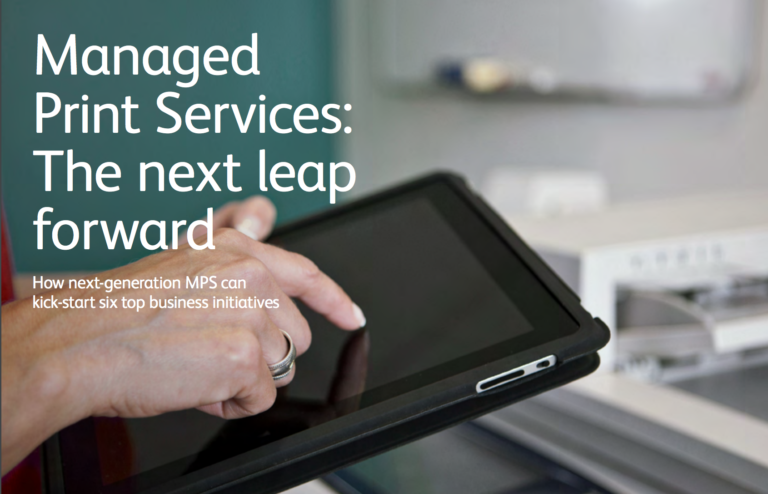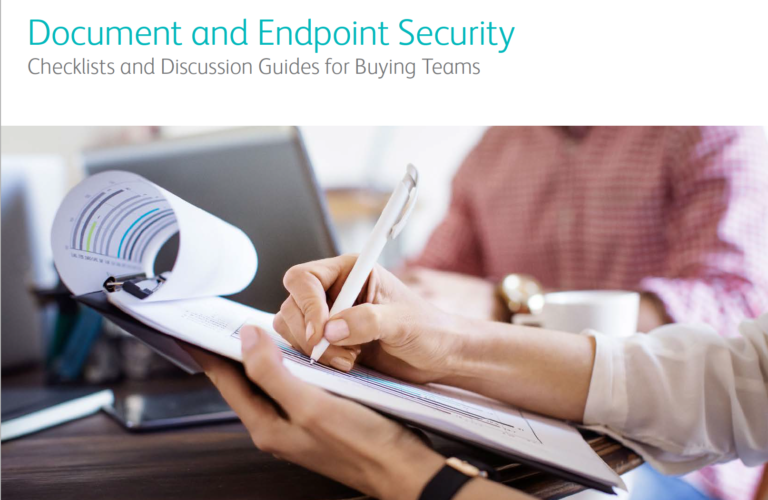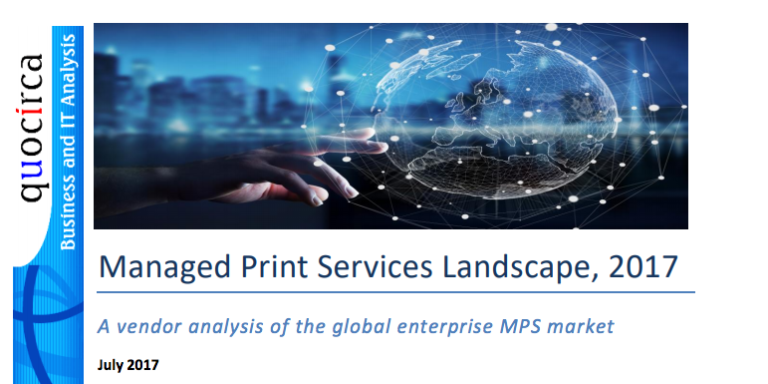
Guest post by Justin Milligan, Managing Director of Xenith Document Systems
Cost reductions are only part of the strategic benefits of MPS (Managed Print Services) that can help to get you noticed.
Few facilities managers want to stay in the same place, but how to climb the career ladder? How do facilities managers get the attention of the board?
The rising stars of many organizations are ultimately those who have a significant impact on the bottom line – meeting business objectives and resolving mission-critical problems by transforming the way that the organization does business.
One productivity issue that tends to resist organizational efficiency drives is office-based document workflows. Despite all the hype of the paperless office, digitization has made only limited inroads to date. But that is starting to change. Process-based and digitization technologies are now combining to make the paperless office a reality. In its Managed Print Services Landscape 2015 report, Quocirca reported that 72% of senior IT managers say they already have some paper-free processes in place, and are planning more. The same report states that companies feel more confident about making the move to digital when they partner with an MPS provider.
Career progression depends on meeting strategic objectives. A reputable MPS provider will help you quantify the benefits of Managed Print Services for your organization in terms of time savings, cost reduction, environmental impact reduction and more. This makes the benefits of MPS more tangible and provides an extra degree of confidence, giving board-level managers the reassurance they need to follow your lead. Good MPS practice is to understand the key goals that a company wants to achieve and then tailor a solution to meet those objectives, through either digitization or optimized print solutions.
Productivity Gains with Digitization
The benefits of a digital-first working culture are now overwhelming. Digital information transforms accessibility, with staff able to consult the business information they need instantly. Collaboration becomes much more straightforward, as people are able to share information much more easily, and version control keeps documents consistent.
It’s also much more efficient – in terms of paper savings as well as the elimination of duplication and errors that characterize paper-based workflows. This can help you create a more efficient and cohesive digital-first office, with streamlined processes and transformed access to documents.
One of the benefits of MPS is the analysis of business processes and recommended strategies and roadmaps to support the shift to digital across the organization. Positive though the outcomes of digitization unquestionably are, how to achieve that continues to be a challenge. It’s so easy to dismiss those change-resistant employees who struggle to adopt the latest technology and remain dependent on the printer. But what if that employee has skills or knowledge that the business needs? An MPS provider can recommend ways of easing the transition to digital processes, to take away the pain of change.
Reassuringly, the Quocirca survey revealed that the benefits of MPS make a real difference here. There was consensus that multifunction devices ease the transition to fully digitized processes. Quocirca reported that organizations partnering with an MPS provider are 19 percent more likely to feel confident about paper to digital integration.
Improved Security
Security is a very worrying area for today’s business leaders, who find themselves operating in a world rife with cyber attacks; these issues were not ones they had to deal with while they were cutting their teeth professionally and moving into leadership positions. The Quocirca survey stated that for 75 percent of senior IT leaders, security was an important driver for engaging MPS.
Managers who are able to safeguard intellectual property, and indeed the reputation of the business as a whole, stand to gain considerable support and credibility. MPS, which can span printed and digital information flows across the enterprise, is an important element in the battle to safeguard data security. An MPS provider can assess your security infrastructure, and make sound technological recommendations.
Reducing the Environmental Footprint
The environmental impact of paper usage is self-evident. At a basic level, digitization will cut these costs and may also save the company money on green taxes. Accreditation to environmental management standards, notably ISO 14001, can make the difference between getting new business and losing it.
On a less tangible level, corporate social responsibility objectives aren’t just about the bottom line – they are about making the world a better place, and they matter a great deal to both internal and external stakeholders.
A good MPS provider will be able to make an environmental assessment of your document infrastructure, quantify projected savings in practical terms like number of trees, litres of water and kilogrammes of carbon dioxide, and will outline how to make improvements in identified areas.
Reducing Costs
Cost reduction remains a key benefit of MPS and will always be of interest to company directors. MPS providers can help you to:
- Cut the costs of equipment, as well as consumables such as toner.
- Put mechanisms in place to help the organization do as little printing as possible.
- Streamline the management of print and document infrastructure.
- Redirect the resourcing saved elsewhere in the business.
Continual Optimization and Innovation
One of the key challenges of a Facilities Manager is to keep all solutions running smoothly and in step with business change. A reputable MPS provider won’t simply design a solution, then disappear until it’s time to renew the contract. They will use insights gleaned from the customer’s usage statistics to provide regular management information on the benefits realized. They may also make suggestions to help you to make further improvements – in some cases, ideas that you to take to the board – that do not necessarily require additional investment.
In its report, Quocirca estimated that almost half of large organizations are already making use of MPS in some way, with a further 20% planning to do so in the next year. The strategic benefits that MPS delivers are now well established. Career progression depends on meeting strategic objectives, and facilities managers have everything to gain and nothing to lose by exploring the value for their own organization.
If you enjoyed reading this article you may also like to download our eGuide: The Great Post-procurement Challenge – How to Track the Business-wide Benefits of MPS.
Takeaways
The strategic benefits of MPS go beyond initial cost and time savings:
-
- A good MPS provider can give strategic guidance as businesses move to paper-free operations
- MPS can deliver on corporate social responsibility, with significant environmental benefits
- MPS can help mitigate the security risks of today’s business information environment
- MPS means significant cost reductions, as well as freeing up resources to add value elsewhere in the business.
This post was originally published by Xenith Document Systems, a leading provider of Managed Print Services, Document Solutions and Workflow Automation in London, United Kingdom. They are a Xerox Platinum Partner, winner of the Xerox MPS Partner of the Year award in the UK, and NewField IT’s Systems Integration Partner of the Year in the UK.


